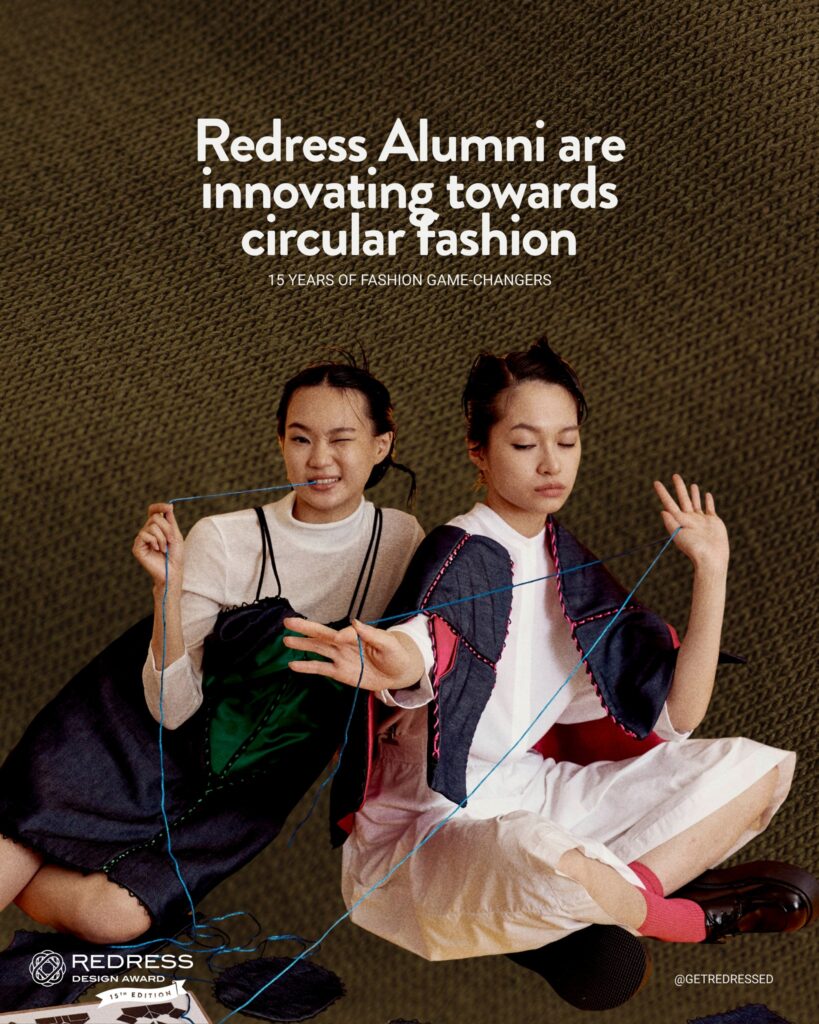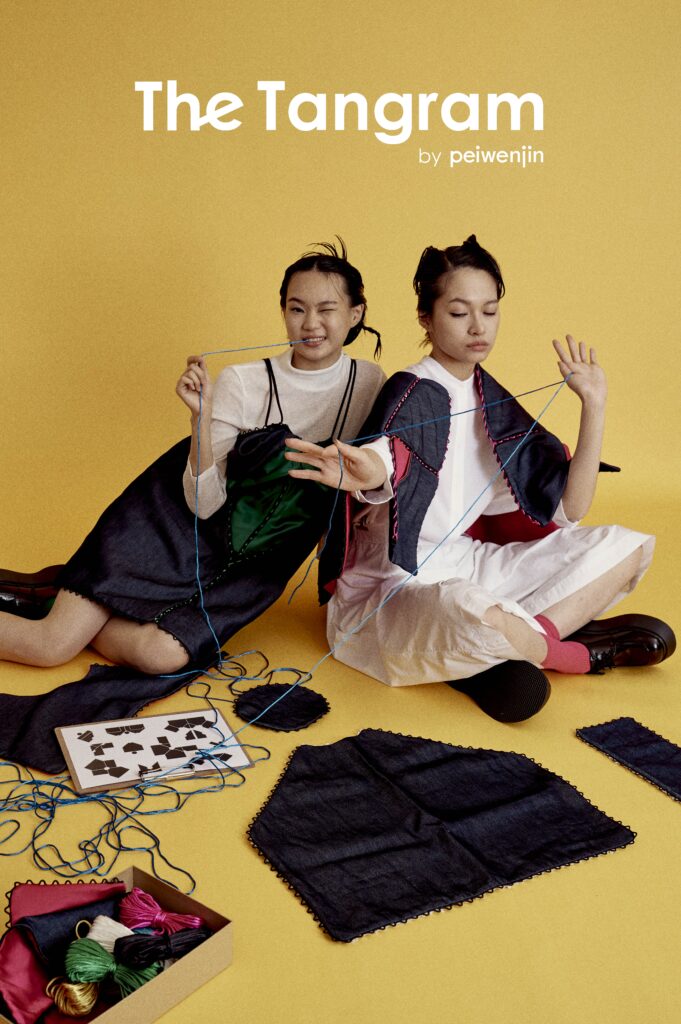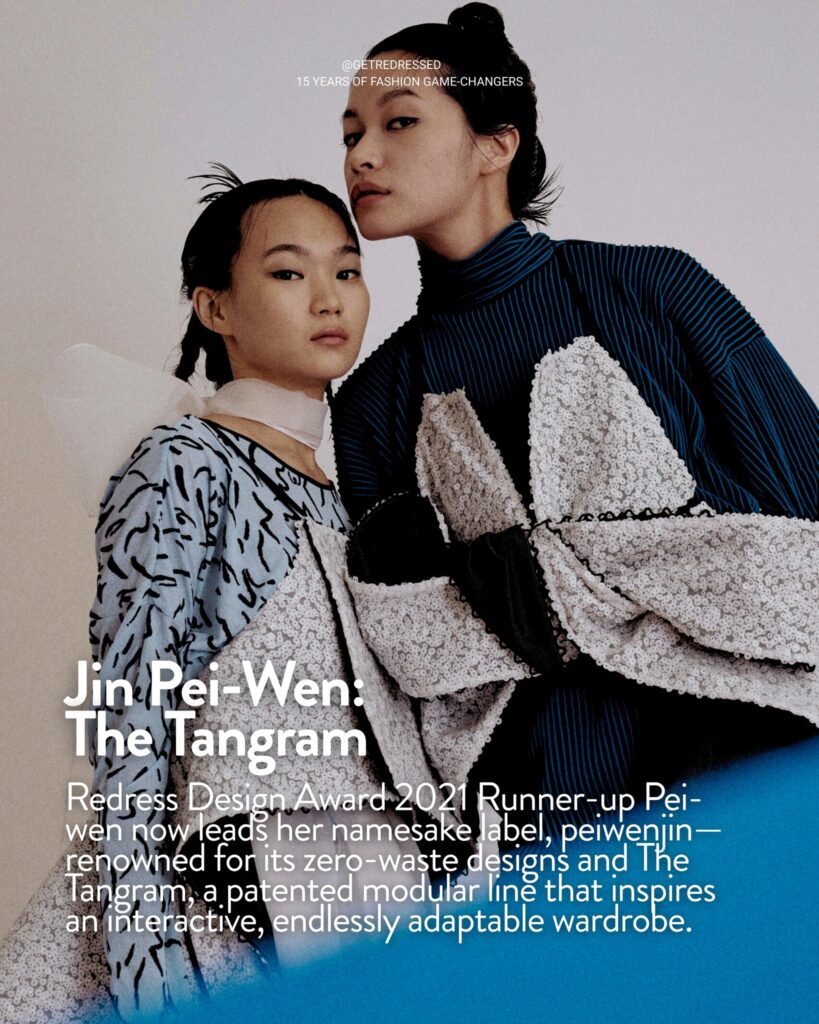How Redress Alumni have been rising to the challenge to accelerate fashion’s circularity

15 years of the Redress Design Award isn’t just a milestone—it’s a testament to the designers who’ve turned fashion’s biggest hurdles into their boldest opportunities. This year, as we celebrate ‘Rising to the Challenge’, we’re spotlighting competition alumni like Pei-wen Jin: fashion game-changers who are proving that circular fashion isn’t just possible—it’s powerful.
Discover how the Redress Alumni Network fueled Pei-wen’s growth, the projects that turned waste into wonder, and why the next 15 years depend on designers like her stepping up.
Please tell us more about your brand and innovation.
The Tangram is a patent-granted experimental line within my sustainable fashion brand, peiwenjin. It introduces a zero-waste modular system inspired by my childhood toy, the tangram puzzle. The system allows garments and accessories to be assembled and reconfigured through a simple threading process, creating a circular, interactive, and endlessly adaptable wearing experience. It offers a new way of building a sustainable wardrobe while embracing playfulness, versatility, and personal expression.
What was the inspiration behind your innovation?
The inspiration came from the tangram puzzle I used to play with as a child. I was fascinated by how a simple set of geometric shapes could create endless forms. That idea deeply influenced the way I approached zero-waste pattern cutting. Each module is like a tangram piece, thoughtfully designed to leave no fabric waste.
Beyond cutting, the assembly process is where it gets truly playful — you can think of it as the LEGO of fashion. Each wearer becomes a player, able to thread, combine, and transform the modules into garments or accessories, and then reconfigure them again when their needs or moods change.

What challenges did you experience in launching it?
The biggest challenge has been making the concept accessible to the public. In Taiwan, many people are unfamiliar with DIY fashion and have found assembling garments a bit too difficult. I’m now considering two directions: offering assembly services for the more complex garment styles, and simplifying the system into accessories or bags for easier public engagement. I’m also exploring the idea of hosting workshops to guide people through the process.
What issues do you hope to tackle with your innovation?
The Tangram addresses key issues such as the environmental impact of fast fashion and textile waste. Through zero-waste pattern cutting, it reduces 15–20% of fabric offcuts that normally become waste during production. It also responds to the emotional disconnect many people have with their clothes and the wastefulness of items worn only once, like formalwear.
At the same time, The Tangram satisfies our natural desire for change by enabling endless transformation of existing pieces, offering the joy of renewal without buying new garments.
Finally, I hope to inspire a deeper respect for resources. Once materials are made into The Tangram modules, they are not fixed in one form but can be reshaped into various garments and accessories, allowing the resources to live on and evolve instead of being discarded.

How has your innovation changed the fashion space since launch?
The Tangram has introduced a fresh perspective to fashion by challenging the traditional idea that garments are fixed and disposable. It opens up a new way for people to interact with their clothes, transforming them repeatedly and making fashion a more playful, creative, and sustainable experience.
Currently, The Tangram is still at an early stage in the market, but the concept has already attracted considerable attention from consumers and stylists who are seeking alternatives to fast fashion and waste. I believe it encourages a shift toward more mindful consumption and a deeper connection between people and their wardrobes, inspiring the fashion industry to rethink the value and lifecycle of clothing.
Anything else to share about your innovation?
The Tangram has been granted a patent, which recognises the uniqueness and innovation of its zero-waste modular system. Using just six simple zero-waste modules, I have already developed three collections, demonstrating the versatility of this concept. Yet, there is still much untapped potential — these few simple shapes can be combined in countless ways to create a truly sustainable and ever-evolving wardrobe.
